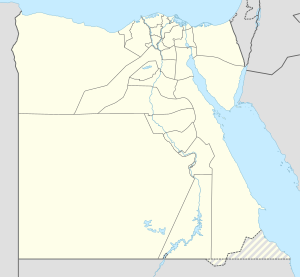Garagos, Egypt
Garagos
جراجوس Jarajus | |
|---|---|
| Coordinates: 25°52′05.1″N 32°45′23.8″E / 25.868083°N 32.756611°E | |
| Country | |
| Governorate | Qena Governorate |
| Population (2006) | |
| • Total | 20,427[1] |
Garagos (Arabic: جراجوس) is a village in Qena Governorate in Egypt, which is famous for "Garagos Pottery".[2]
The older name of the village is Jazirat Qaraqush (Arabic: جزيرة قراقش).[3]
This village is the birthplace of Saint Verena.
History
[edit]The village became a center for the development projects of the first Egyptian NGO, the Association of Haute-Égypte (Association of Upper Egypt), founded by Catholic missionaries including the Jesuits Stéphane de Montgolfier (1907–2000), Maurice de Fenoyl (1909–2004), and Philippe Ackermann (1914). The association founded a School in 1947. Later under the leadership of Ackermann the village established a pottery studio and installed its workshops in a Nubian-style domed mud-brick building built by the celebrated architect Hassan Fathy. They also founded a weaving studio for young women, which aimed to provide more opportunities for female development, under the supervision of Folla el-Masri (1919–2003), an Egyptian woman from Asyut. In the 1950s and '60s the village's artisanal workshops attracted French and Swiss tourists who visited nearby Luxor and offered a model for linking tourism to rural development.[4]
References
[edit]- ^ "البيانات السكانية لمدينة أو قرية حسب تقديرات السكان 2006". الجهاز المصري المركزي للإحصاء. Archived from the original on 15 August 2012. Retrieved 12 August 2012.
- ^ Elkamel, Sarah (17 Dec 2010). "Folk Arts: Garagos pottery in town". Al-Ahram. Retrieved 28 May 2016.
- ^ Ibn Mammati. Kitāb Qawānīn al-Dawāwīn (in Arabic). p. 167.
- ^ Mayeur-Jaouen, Catherine (2019). Voyage en Haute-Égypte : prêtres, coptes et catholiques. Robert Solé. Paris. pp. 116–17. ISBN 978-2-271-11614-7. OCLC 1081303684.
{{cite book}}: CS1 maint: date and year (link) CS1 maint: location missing publisher (link)

